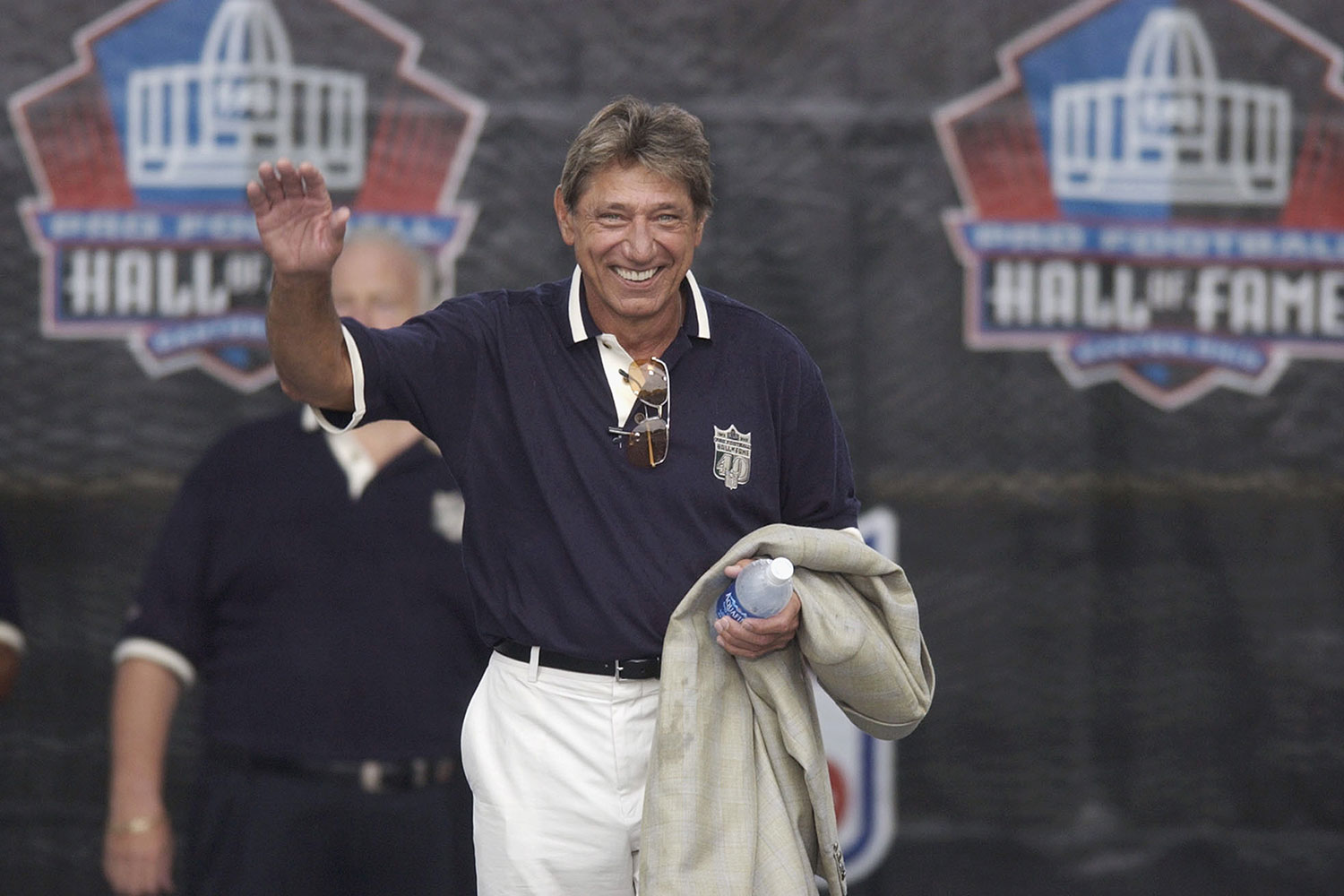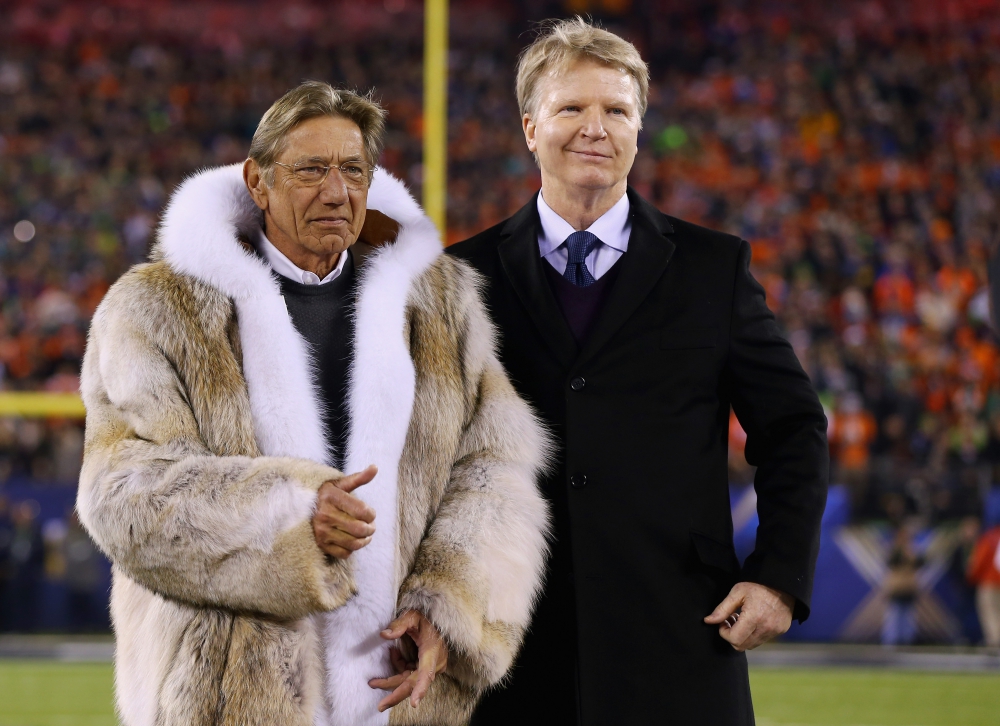
Broadway, Baby!
There are few figures that have transcended football quite like former New York Jets quarterback Joe Namath. Alex Cassidy remembers a man whose legend has continued to live on long since his retirement.
“We’re going to win the game, I guarantee it.” All football historians know the legendary, perhaps apocryphal, story of Joe Namath’s prediction. Three days before the New York Jets took on the Baltimore Colts in Super Bowl III, Namath made a public appearance in front of a throng of eager reporters. The upstart Jets were underdogs going into the game, by 18 points, and analysts had suggested that the American Football League’s team wouldn’t have even made the playoffs if they competed in the National Football League, the home of the Colts. Namath, confronted by a rowdy Baltimore fan, frustratingly predicted the win for his team, kicking off a Super Bowl media storm that likely hasn’t been matched since. After Hurricane Namath had settled, he had to back up his words. Namath completed 17 of 28 passes to garner the Super Bowl MVP on the way to a shocking 16-7 win for New York; shocking, of course, to everyone except Broadway Joe. That game was the first time an AFL team had beaten an NFL team in the big game and, as a result, helped to change perceptions league-wide. A year later, the NFL-AFL merger was finalised and history, thanks in part to the New York Jets, had been made.
[divider] [field “factfile”]Namath was an icon of his time; an easy comparison would be to say that he was the George Best of American football. He shook up the league with his long hair and partying, but was also remembered for his brilliance with a football. The most eligible bachelor of the day, Namath said after his Super Bowl III win: “When we won the league championship, all the married guys on the club had to thank their wives for putting up with all the stress and strain all season. I had to thank all the single broads in New York.” This lifestyle made him both an enemy and hero. An enemy to the old guard of the NFL, to the war-hardened coaches and fans that saw his long hair and rebellious attitude as indicative of a wider cultural leaning in the late 1960s; a hero to similar rebels and teenagers who needed, among all of the other societal change, a footballing icon to attach themselves to. Former teammate Joe Dockery summed this ethos up: “He was a guy that came along and broke a lot of the conventions. He was like a rebel with a cause. It was like travelling with a rock star. He just was a magnet. He’s attracting people. And mostly young people. And talk about excitement and energy. Wow!” Namath won the hearts of the young and old alike, however. The old guard appreciated his footballing prowess and relentless toughness on the field, while the youngers agreed with his larger-than-life party attitude and anti-establishment persona. Broadway Joe’s meteoric rise to the top of the US’ cultural consciousness changed the way the NFL was perceived, and proved a big part of his earning a gold jacket in 1985.
Critics will look back at his career statistics – 173 TDs, 220 Interceptions, .501 passing percentage and 65.5 passer rating – and say that he doesn’t deserve the accolade. But Joe’s career meant more to the league for what he stood for, rather than as a pocket passer. As a result, it is widely accepted that Namath, despite not having the gaudiest of stats, was a central part of football’s revolutionary changes in the 1960s, as well as an essential piece of the development of the NFL, and its individual athletes, toward the multi-billion dollar powerhouse that they are today.
[divider]
Broadway Joe’s story started in much more auspicious circumstances. Joseph William Namath was born on May 31 1943 in Beaver Falls, Pennsylvania to Janos Nemeth and Rose Juhasz. Beaver Falls, a rural town in the heart of the Rust Belt, had a reputation for being blue-collar. Joe’s grandfather was a worker in the steel and coal industries, and instilled these same working-class values in Namath.
Despite this, he always had one eye looking forward, away from the humble beginnings that he was born into, and towards a more prestigious future. A gifted athlete, Joe excelled in baseball, basketball and athletics, but it was on the gridiron field that he felt most at home. He guided his football team to a 10-0 undefeated record and won the state championship in their division. Upon graduation, he was highly touted by Major League Baseball but, at the behest of his mother’s desire for him to get a college education, he chose Bear Bryant’s Alabama – something that the legendary coach would later remark was ‘the best coaching decision I ever made’.
Namath found instant success at Alabama, throwing for 1,192 yards in his freshman year, good for #1 in the SEC. A threat with both his legs and arms, he had no problems fitting in on the field; it was off the field, in Alabama’s strict segregationist culture that he had trouble. The infamous ‘Stand in the Schoolhouse Door’ incident, where the Governor of Alabama prevented a black student from entering by stating: ‘segregation now, segregation tomorrow, segregation forever’, occurred in Namath’s sophomore year. It was another view that he rebelled against, once stating: ‘I don’t care what a man is as long as he treats me right. He can be a gambler, a hustler, someone everybody else thinks is obnoxious, I don’t care so long as he’s straight with me and our dealings are fair’. Namath’s hometown had a large proportion of African-Americans in the Lower-End neighbourhood where he grew up; as a result, he would often get into arguments defending African-Americans to his teammates. Despite all of the surrounding issues in the University, the 1964 team, due to their 10-0 record and #1 AP ranking, were awarded the National Championship. The season would turn out to be Joe Willie’s last, as in November of that year two rival leagues were drafting, and his name was certain to be picked.
The 6ft 2ins, 200lbs quarterback belonged to an incredible draft class, albeit one that was split between two competing leagues. The first round of the NFL draft featured luminaries such as Dick Butkus and Gale Sayers (taken consecutively by the Chicago Bears, in what was an incredible two picks), meaning that Namath fell to the 12th overall pick, selected by the St. Louis Cardinals. However, the AFL were drafting at the same time and the New York Jets, who had stumbled to a 5-8-1 record, selected Namath with the first overall pick in a truly franchise-changing move. As a result of the then-record $420,000 signing bonus offered to Namath (and brand-new Lincoln Continental), he never played a down in St Louis, and instead got on a plane to the Big Apple.
It was certainly true that Broadway Joe left women of the time weak at the knees, but it was also a problem that he suffered himself throughout his career. Near the end of his final season at Alabama, he was the victim of a catastrophic knee injury – something that would be a recurring theme for him down the road. In the award-winning HBO documentary ‘Namath’, many peers from the time lament how much the knee injuries dramatically affected his athleticism, wondering how much more he could have done if the professional leagues had seen him at full speed. Mark Kriegel eloquently writes in his biography of Namath: “It is difficult to imagine an activity more deleterious to the human knee than professional football”, a poignant observation of how much it limited the Jets quarterback’s career. Namath would have knee operations later in his life, after football had ended, and was reportedly said to have his knees drained between games, in order to maintain the level of play that was not only expected from his adoring public, but that he saw as a pre-requisite for himself.
As the #1 overall pick of the New York Football team in the late 60s, Namath enjoyed a level of fame and attention that was previously unheard of in sports. Peers compare it to a travelling rockstars like Elvis or the Beatles, such was the power of the Namath Effect. Jets owner Sonny Werblin said when his team signed him: “Namath has the presence of a star. You know how a real star lights up the room when he comes in. Joe has that quality.”

Namath was the tonic that the AFL needed, the poster-boy for a league that was still considered second-rate by its footballing peers. Because, his off-field largess aside, he needed to win, or the glaring spotlight of New York would quickly start to burn. Brought along slowly by Hall of Fame coach Weeb Ewbank, Namath didn’t play until halfway through his rookie year. By his second season, he was attempting the most passes in the AFL, with mixed results. In 1966 and ‘67 he led the league in passing yards, attempts and completions, but also interceptions. His 4,007 yards in 1967 make him the only man to pass for the mark in a 14-game season, and was starting to set a new precedent for the passing game in both the AFL and NFL.
Namath may have started to make waves individually (he was named an AFL All-Star in 1965, 1967 and 1968), but the team had struggled to put together a winning season. That all changed in 1968 when the Jets went 11-3, on the back of more controlled play from their signal caller, who cut his interception total by nearly half from the year before. The Jets hosted the 12-2 Oakland Raiders, who had already played a playoff tiebreaker the week before against the 12-2 Kansas City Chiefs. The Jets, who were again the underdogs, knocked off the Raiders 27-23, and earned the right to represent the AFL in Super Bowl III, to be held in Miami against the Baltimore Colts. On the back of his running game (many argue that full-back Matt Snell should have been MVP given he finished with 121 yards and a touchdown) and slick precision in the Super Bowl, the Jets won the game 16-7, largely neutering Johnny Unitas and his dangerous passing attack.
The game is already in the annals of history due to the prediction and AFL win, but the degree of fame, or perhaps infamy, that Namath was catapulted to as a result of his brash prediction and bold play was something that perhaps even he wasn’t prepared for. He was given his own television show, which he began hosting in 1969, and, as a result of his Hollywood good-looks, offered multiple roles in television shows, which he began to take in 1970 with injuries beginning to affect him.
Namath completed just a sole season injury-free after the 1970 merger, while the Jets, missing their star quarterback, also struggled, going 23-38 with Namath under centre from 1970-77, when he made the move out West to the Los Angeles Rams. His swansong with the Rams didn’t produce many statistics; he barely was on the field and retired the season after, but it was a sign that Namath was continually on the move.
Even though Joe Willie from Beaver Falls, Pennsylvania had become Broadway Joe, the most recognised face in America, he was still looking for something more, to break into the acting scene in Los Angeles, when he could afford to stand still. “When you have confidence, you can have a lot of fun. And when you have fun, you can do amazing things,” he said.
Namath lived up to those words. He started as a confident southerner trying to penetrate the New York scene in the 1960s, had a lot of fun leading rebellious AFL to a shocking win over the NFL at the peak of his time with the Jets, and subsequently finished an amazing career as a true icon of the professional game.
This is an edited version of an article that appeared in Issue IV of Gridiron Magazine. To subscribe to the magazine, and enter the draw to win a trip to the AFC or NFC Championship Game, click here.
